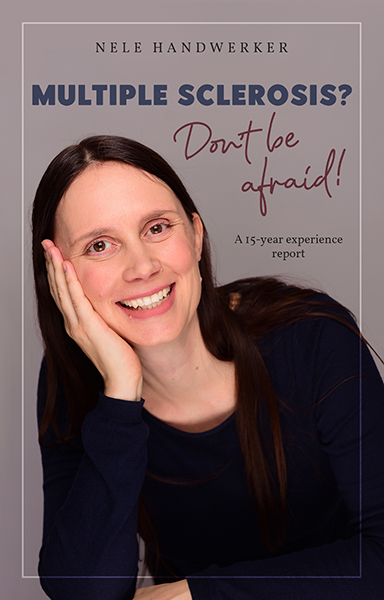Lori Schneider decided after her MS diagnosis to focus fully on adventure, climbing the highest peak on each of the seven continents. To do so, she trained hard, quit her job as a teacher, left her husband and took out a loan to cover the costs of this undertaking. She achieved her goal and has since taken many people with multiple sclerosis, as well as the general public, on her personal journey in presentations, including a TED Talk where she impressively described the act of strength it took to fight her way up Mount Everest step by step.
In the interview she gives insights into her life with MS and her philosophy to live her own dreams and to regain self-confidence in her own physical and mental strength.
Klicken Sie auf den unteren Button, um den Podcast zu laden.
Table of Contents
Introduction – Who is Lori Schneider?
At age 52, Lori Schneider became the first person with multiple sclerosis to summit Mt. Everest. Lori is also the first with MS to climb the highest peak on each of the 7 continents, known as the Seven Summits. She reached the summits of Mt. Kilimanjaro, Mt. Elbrus, Denali, Aconcagua, Vinson Massif, Mt. Kosciuszko, and Mt. Everest.
Now, at 67 years old, Lori continues to live an active life, along with her husband. Together they enjoy hiking in Arizona, boating on Lake Superior in Wisconsin, skiing in the mountains, and traveling. She continues to give presentations globally, and remains an advocate for those living with neurological disorders.

MS diagnosis and status
When were you diagnosed with multiple sclerosis and what led to it?
In Jan. of 1999, I swung my legs out of bed, getting ready to start my day with exercise on the treadmill. My foot felt like it was asleep, with a ‚pins and needles‘ sensation. As I began to move, I realized that the feeling covered the entire right side of my body, as if someone had drawn a line from head to toe, down my torso. It took many months for the diagnosis of multiple sclerosis to be determined.
Did you have any previous symptoms that, in retrospect, were related to multiple sclerosis?
I was officially diagnosed with MS in 1999, but I now realize that many of the symptoms I had been experiencing years earlier, were MS related as well. In the 80’s and 90’s, my sporadic leg numbness and general muscle weakness was labeled an „autoimmune disorder“.
How were you feeling about the diagnosis and what was it like for your loved ones?
I panicked, when the doctors uttered those two letters …MS. My world came crashing down around me, as I feared the end of a physical life I had come to love. Within two months of the initial numbness, the opposite side of my body had gone numb as well. The doctors told me it was rapidly progressing in my body. I feared the worst, as they told me that I might be in a wheelchair soon.
My parents and husband were very worried and sad, because none of us knew anything about MS.
What was your rock bottom with multiple sclerosis and how did you fight your way back out?
After treatment for my MS, the numbness eventually went away. Still, I was very afraid. I left my old life, in hopes of completing all the things I had ever wanted to do, while I still had good use of my legs. I left my 22-year marriage, quit my 20-year teaching career that I loved, sold my house, moved away from my friends and community, and fled from me fears. Mountain climbing gave me back my strength, both mentally and physically. I needed to find my emotional strength again, and prove to myself that I was still in control of my body.
Did you receive any recommendations for disease-modifying therapies at the beginning, and what was your decision?
When I had my first MS exacerbations in 1999, I was given a 5-day intravenous steroid treatment in the hospital. It took about 6 months for my initial symptoms to go away. Each case of MS is unique, and what works for one person may not work for others, so you need to discuss options with your neurologist. There are so many new treatments available today. The key is careful monitoring from a neurologist, because much of MS occurs without notice.
Have you had a change in therapy and if so, for what reason?
My goal has always been to maintain mobility. Over the course of my MS years, I have tried to eat a healthy diet, and to exercise often. My neurologists recommended taking Vitamin D3, Calcium, and omega oils.
How are you currently doing with your MS?
I am one of the lucky ones and my disease has been stable for 16 years, but I continue to have yearly brain scans. I am now 67 and I’m choosing to remain physically active. I still lift light weights at the gym three times a week, do some yoga stretching, and do a lot of walking and hiking. It is important to choose an activity that YOU like, so that you will continue to move your body several times a week. It is also very important to engage in social activities, so that you nurture your spirit. To calm my mind, I also meditate and try to maintain a positive attitude toward life and my health.
Climbing beyond limits

Did you decided right away to climb the seven summits or how did that plan evolve?
I had already climbed Mt. Kilimanjaro in Africa before my diagnosis. I had no plan at the time, but knew that I enjoyed climbing with my father. Then, after I was diagnosed with MS I had to prove to myself that my physical life was not over.
For twenty years I taught elementary and handicapped children. My goal as a teacher was to help children believe in themselves and not be afraid to try. Now it was my turn to learn that lesson. I needed to move beyond the label of MS. In attempting a goal as lofty as Everest, I gave myself permission to try. I had to believe in myself, in order to live my dreams. Sure, I may not always succeed at what I attempt, but there is no failure in that. The success is in the journey…it is always in the journey.
How did you prepare for climbing up all these mountains?
Physically it took nearly a year for me to train for a big mountain climb. My training involved strength and endurance training. I trained by walking about 5K most days, and also walking some hills. I worked my way up to 20 Kilos of weight in my backpack as I hiked. I also did balance exercises, like sitting on a large balance ball or standing on a balance disk. These helped develop my core strength. Mentally, I prepared by telling myself it is ok to try. I never know what the outcome will be, so I have to get out there and just do it. Financially I had very little monetary resources, so I took out a bank loan for the some of the expensive climbs. I was able to pay back my loans through public speaking engagements.
How long did it take you to finalize that goal and have there been any setbacks?
An epic journey can take years, and for me it took 16 years to finally climb all “Seven Summits”, meaning the highest peak on each continent. In 2006, several years after I started climbing, I had a problem with optic neuritis again. After a physically difficult climb of Denali in Alaska, my vision blurred and became darker in one eye. The doctors put me on an IV steroids treatment once again, and my vision returned to normal. Since then, I have had no MS symptoms.
What let to the concept of climbing with other MS and Parkinson patients to Mt. Kilimanjaro and how many joined you?
After 16 years of striving to achieve my goal of climbing the 7 summits, I felt it was time to create new dream. For me, the joy of mountain climbing is realizing that you are stronger than you think. It was a lesson I needed to learn and BELIEVE, when I was first diagnosed with MS. Now, it was my turn to help teach others that lesson of self-empowerment. It was time to help those with neurological diseases like MS and Parkinson’s Disease, believe in themselves again and not be afraid to try. On our MS and Parkinson’s climb of Kilimanjaro, we had 10 people living with MS, and 4 people living with Parkinson’s Disease. We also had 14 companion hikers with us, so each person living with a disease had someone to hike along with them. In the end, 7 of the 10 with MS reached the summit, and all 4 people with Parkinson’s reached the summit, along with their companions. Everyone achieved their goal of self-empowerment and finding their courage and strength once again.
Experiences and coping strategies
In your experience, what are some of the most effective coping strategies or self-care practices for managing the daily challenges of living with MS?
For me, I needed to be my own advocate. Many people do not understand what we may be going through from day to day, so we must nurture ourselves and be a caregiver to our own needs. If that means we need rest, then take a break. If that means we need to lessen our responsibilities and stress in life, find people who can help relieve some of the daily schedule and pressures. Learn coping skills like yoga or meditation to calm the mind and strengthen the body. Make time for yourself, but also enjoy the company of friends and family who love and support you on this MS journey.
How important is mental health and emotional well-being for individuals with MS, and what are your tips?
I believe that a person living with a disease can suffer on many levels. For me, fear of my disease was the most difficult part of MS. It brought on depression, sadness and worry. I needed to find peace once again, and I achieved that through being in the mountains and in the outdoors. It is vital that we find ways to soothe our soul, because our emotional well-being and positive attitude also helps us get stronger inside and out.
Education, Awareness, and Advocacy
What initiatives do you support that raise awareness about MS and educate the public about the condition?
When I was first diagnosed with MS I was afraid to talk about it. I was afraid people would think I was weak. It took me some time to grieve for the life I once had, but then realized that my future was up to me. I started talking about my disease in public and at MS events. I volunteered and participated in MS walks and bike rides to raise money for research. I began to give presentations around the globe to health and MS organizations, in hopes of raising awareness of our disease. I began organizing events for others with MS, to help them build a stronger network also. I listened, offered advice when I could, and let them know that they are not alone.
Can you share any recommendations, how individuals with MS can actively advocate for themselves and ensure they receive appropriate care, support, and accommodations?
I think it is important to connect with your local, national and international MS societies. They are a wealth of information and can often assign a health partner for you to speak with when questions arise.
What advice would you give to people with MS who may be feeling overwhelmed or discouraged? How can they maintain a positive outlook?
Be resilient. Life will get better if you let it. Create a life that is fulfilling, regardless of your physical abilities. Believe in the possibilities of life and don’t define life by what you believe to be impossible.
Quickfire Q&A Session
Complete the sentence: "For me, multiple sclerosis is...."
a disease that may bring fear of the unknown, but that unknown can also empower you to move beyond fear and live a life of discovery and adventure.
Which website can you recommend for people living with MS?
What development would you like to see in the field of multiple sclerosis in the next 5 years?
I think we must continue to find ways to support the whole person, both physically and mentally. Offering alternative therapies that enrich people’s lives is very important. Dance, yoga, music, exercise and sports, can all assist the medicines, helping to make our body and minds stronger.
Farewell
Finally, what message of hope or encouragement would you like to share with individuals living with MS?
Never giving up on your dreams. It’s all about moving beyond your ‘preconceived’ limitations, and finding your own Inner strength. It’s about your mindset and choosing to be resilient, and living with gratitude for all that you still have in your life. A positive attitude creates positive outcomes.
How and where can interested people find you online?
Email: Lori@ETAdventure.com
Website: www.LoriSchneider.net
Follow the adventure on Facebook and Linkedin
“My goal is to empower others to move beyond their labels and limitations and live their dreams.”
~Lori Schneider Empowerment Through Adventure
I hope you got insprired by Lori and can find the strength inside you to go for your dreams no matter how long it takes. And as Lori stated do it one step after the other. That way incredible journeys are possible.
See you soon and try to make the best out of your life,
Nele
For more information and positive thoughts, subscribe to my newsletter for free.
Click here for an overview of all podcast episodes published so far.

And at many more places.
* This text contains affiliate links. This means that I get a small compensation if you buy the product recommended by me through the link. For you nothing changes in the price of the product. And it helps me to pay for the blog and to write new posts.










